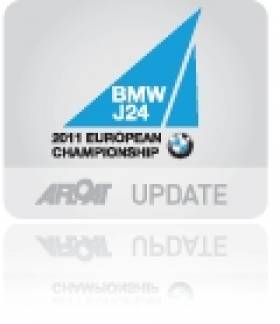Displaying items by tag: Penfold
Penfold Wins J24 Euro Title in Last Race Decider
Top of the table was 'Reloaded' (Mark Penfold), sailing under US colours, with 34 points, three ahead of the leading European entry 'Il Riccio' (Ian Southworth/Chris McLaughlin) which takes the European Championship trophy.
With the exception of their discard of a 20th in the fifth race, 'Reloaded' was consistently in the top four in most races and had one bullet, while closest rivals 'Il Riccio' had two bullets and only a 9th to discard.
That they had some 28 points to spare over the third placed 'Serco' (Bob Turner) emphasised their dominance over the series. The German champion 'Rotoman' (Kai Mares) was only a point behind in 4th place and won the final race of the regatta while Stuart Jardine, the oldest helm in the championship, had the distinction of winning three races, including the first two races of the final day. Another German boat 'Hungriger Wolf' (Johann Huhn) had six top ten results to earn 6th overall.
Local boat Jibberish (O'Kelly/Wormald/Walsh) enjoyed its best result when finishing second behind 'Stouche' (Jardine) in the seventh race while German entry 'JJone' (Frithjof Schade) was looking at the same transom in the eighth race. The Southworth/McLaughlin crew topped the fleet in the penultimate race followed by the Hungarian boat 'Naviscon' (Farkas Litkey) while 'Serco' took second behind 'Rotoman' in the final race.
Needing to beat their US rivals by several places in the last race to take 1st overall, 'Il Riccio' could only manage an 8th to 'Reloaded's' 5th.
The leading Irish crew was 'Hard on Port' (Flor O'Driscoll, HYC) in 10th overall with 'Jamais Encore' (John-Patrick McCaldin, Lough Erne YC) next best in 17th.





























































